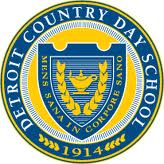Author Jim Collins, in his book Good to Great, writes "Good is the enemy of great....we don't have great schools primarily because we have good schools." His point is that schools, and most organizations, that reach a level of proficiency become complacent and don't move beyond good. They stop reflecting on their practices, and do things the way they've always done them because these practices have proven over time to be good. Country Day School is a school that is great already in most respects, but we're committed to being "greater" in every way possible.
One of the initiatives we've undertaken this year is a horizontal and vertical integration of our curriculum. We have used a process we are calling "5 in / 5 out" as the vehicle for aligning our curriculum. The goal is to identify the five essential skills for a student coming into a content area by course or grade level, and the five essential skills or pieces of content knowledge with which a successful student will leave. In this way, we will link together all courses, content areas, and grade levels in the school, pk-12. We will also have a mechanism for eliminating unnecessary redundancies, and filling gaps that we discover exist. Through this process, teachers are meeting not only with their departmental or grade level colleagues, but also with teachers whose courses or grade levels come before and after them in the vertical path towards graduation. We have undertaken this endeavor not because we necessarily feel there are issues with our current curriculum, but so we can open dialogue between faculty at all levels, evaluate our own practices, and look for ways to make a great school even greater.
By the end of this school year, we anticipate that we will have completed our curriculum alignment, and will shift our efforts to discussion of "how we teach" rather than "what we teach". In this ongoing evaluation of curriculum and practice, we hope to establish strong connections across grade levels, and really develop the "One Country Day" concept of shared and collegial collaboration. One of the foundations of Detroit Country Day School is a commitment to excellence, and part of that commitment is consistent, ongoing self-reflection and evaluation. To paraphrase Thomas Edison, "If there's a way to do it better - find it."
Happy Holidays to all of our Country Day families. We wish you a happy and healthy holidays season and New Year.
